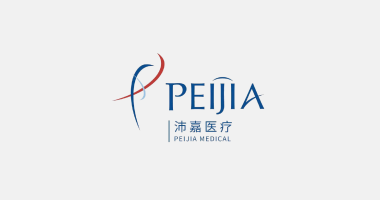Peijia Medical's Strong Growth in 2024: A Deep Dive into Interim Results
August 29, 2024, 1:04 am

Location: United States, California, Irvine
Employees: 51-200
Founded date: 2013
Total raised: $249M
Peijia Medical, a prominent player in China's medical device market, has unveiled its interim results for the first half of 2024. The numbers tell a compelling story of growth, resilience, and strategic execution. With a sharp focus on transcatheter valve therapeutics and neurovascular interventions, Peijia is not just surviving; it’s thriving.
The company reported an operating revenue of RMB 301.2 million, marking a remarkable 33.9% increase compared to the same period last year. This surge is no accident. It stems from a combination of factors that have propelled Peijia into the spotlight. The transcatheter aortic valve replacement (TAVR) products have gained significant traction across China. The company’s strategic maneuvers in winning bids for coil products have also paid off, leading to a spike in sales volume.
Peijia's gross profit reached RMB 218.9 million, a 26.5% increase year-over-year. The gross profit margin remains robust at 72.7%. This indicates that the company is not just increasing sales but doing so efficiently. Expense ratios have decreased across the board, thanks to improved operational efficiency. Selling and distribution expenses, administrative costs, and R&D expenditures have all seen significant reductions. This efficiency is akin to a well-tuned engine, driving the company forward while minimizing waste.
Despite these gains, Peijia reported a loss of RMB 71.3 million for the first half of 2024. However, this represents a 66.4% improvement from the previous year’s loss of RMB 212.3 million. The narrative here is one of progress. The company is narrowing its losses while expanding its market presence.
Peijia's Chairman and CEO, Dr. Yi Zhang, emphasized the importance of their experienced sales and marketing team. Their execution has been key to capitalizing on market opportunities. The company is on track to meet or exceed its guidance for both business segments. With ongoing product launches and clinical trials, Peijia is building positive momentum. The excitement is palpable as they look to expand their TAVR market share and maintain profitability in the neurointerventional sector.
Looking ahead, Peijia has reiterated its full-year guidance. The company aims to capture 23%-27% of the domestic transfemoral TAVR market and expects revenue growth of 35%-45% in its Neurointerventional Business. These targets are ambitious but grounded in the company’s recent performance.
Breaking down the results by segment reveals more about Peijia's strategy. The Transcatheter Valve Therapeutic (TVT) business generated RMB 130.3 million in revenue, a 21.0% increase from the previous year. Gross profit in this segment rose to RMB 106.6 million, up 13.7%. The selling and distribution expense ratio saw a dramatic decrease of 34.0 percentage points. This improvement reflects a growing sales scale and enhanced efficiency within the sales team.
The TVT segment is inching closer to profitability. Commercial losses have plummeted by 92.4%, down to RMB 2.5 million. The company has placed its products in over 100 new hospitals, bringing total penetration to more than 580 facilities. Implant volumes surged to approximately 1,750 units, a staggering 40% increase year-over-year. This growth outpaces the overall market growth rate of 20%. Peijia now holds an estimated 25% of the transfemoral TAVR market share in China.
Innovation is at the heart of Peijia's strategy. The company has completed patient enrollment in three pivotal trials for its TAVR products. These trials are crucial for advancing their offerings in durability-enhanced TAVR and treatments for aortic regurgitation and mitral regurgitation. The recent approval of the TaurusMax TAVR system by the NMPA in August 2024 is a significant milestone, showcasing Peijia's commitment to expanding its product portfolio.
On the neurointerventional front, Peijia's revenue reached RMB 170.9 million, a staggering 45.9% increase from the previous year. This growth is evenly distributed across hemorrhagic, ischemic, and vascular access products. The opening of new national stroke centers in China has heightened awareness and accessibility to neurointerventional procedures. Peijia's marketing efforts have complemented this trend, enhancing professional education in the field.
The neurointerventional segment also reported a gross profit margin of 65.7%. While this is a slight decrease from the previous year, the overall profitability of RMB 28.7 million for the first half of 2024 is a positive sign. The company anticipates continued profitability in this segment for the remainder of the fiscal year.
Peijia Medical, established in 2012 and headquartered in Suzhou, China, is on a trajectory to become a global leader in medical devices. With three TAVR systems and sixteen neurointerventional devices already commercialized, the company is poised for further growth. Its focus on innovative solutions for structural heart and neurovascular diseases positions it well in a high-growth market.
In conclusion, Peijia Medical's interim results paint a picture of a company in motion. With strong revenue growth, improved operational efficiency, and a commitment to innovation, Peijia is not just navigating the complexities of the medical device market; it is thriving. The road ahead is filled with opportunities, and Peijia is ready to seize them.
The company reported an operating revenue of RMB 301.2 million, marking a remarkable 33.9% increase compared to the same period last year. This surge is no accident. It stems from a combination of factors that have propelled Peijia into the spotlight. The transcatheter aortic valve replacement (TAVR) products have gained significant traction across China. The company’s strategic maneuvers in winning bids for coil products have also paid off, leading to a spike in sales volume.
Peijia's gross profit reached RMB 218.9 million, a 26.5% increase year-over-year. The gross profit margin remains robust at 72.7%. This indicates that the company is not just increasing sales but doing so efficiently. Expense ratios have decreased across the board, thanks to improved operational efficiency. Selling and distribution expenses, administrative costs, and R&D expenditures have all seen significant reductions. This efficiency is akin to a well-tuned engine, driving the company forward while minimizing waste.
Despite these gains, Peijia reported a loss of RMB 71.3 million for the first half of 2024. However, this represents a 66.4% improvement from the previous year’s loss of RMB 212.3 million. The narrative here is one of progress. The company is narrowing its losses while expanding its market presence.
Peijia's Chairman and CEO, Dr. Yi Zhang, emphasized the importance of their experienced sales and marketing team. Their execution has been key to capitalizing on market opportunities. The company is on track to meet or exceed its guidance for both business segments. With ongoing product launches and clinical trials, Peijia is building positive momentum. The excitement is palpable as they look to expand their TAVR market share and maintain profitability in the neurointerventional sector.
Looking ahead, Peijia has reiterated its full-year guidance. The company aims to capture 23%-27% of the domestic transfemoral TAVR market and expects revenue growth of 35%-45% in its Neurointerventional Business. These targets are ambitious but grounded in the company’s recent performance.
Breaking down the results by segment reveals more about Peijia's strategy. The Transcatheter Valve Therapeutic (TVT) business generated RMB 130.3 million in revenue, a 21.0% increase from the previous year. Gross profit in this segment rose to RMB 106.6 million, up 13.7%. The selling and distribution expense ratio saw a dramatic decrease of 34.0 percentage points. This improvement reflects a growing sales scale and enhanced efficiency within the sales team.
The TVT segment is inching closer to profitability. Commercial losses have plummeted by 92.4%, down to RMB 2.5 million. The company has placed its products in over 100 new hospitals, bringing total penetration to more than 580 facilities. Implant volumes surged to approximately 1,750 units, a staggering 40% increase year-over-year. This growth outpaces the overall market growth rate of 20%. Peijia now holds an estimated 25% of the transfemoral TAVR market share in China.
Innovation is at the heart of Peijia's strategy. The company has completed patient enrollment in three pivotal trials for its TAVR products. These trials are crucial for advancing their offerings in durability-enhanced TAVR and treatments for aortic regurgitation and mitral regurgitation. The recent approval of the TaurusMax TAVR system by the NMPA in August 2024 is a significant milestone, showcasing Peijia's commitment to expanding its product portfolio.
On the neurointerventional front, Peijia's revenue reached RMB 170.9 million, a staggering 45.9% increase from the previous year. This growth is evenly distributed across hemorrhagic, ischemic, and vascular access products. The opening of new national stroke centers in China has heightened awareness and accessibility to neurointerventional procedures. Peijia's marketing efforts have complemented this trend, enhancing professional education in the field.
The neurointerventional segment also reported a gross profit margin of 65.7%. While this is a slight decrease from the previous year, the overall profitability of RMB 28.7 million for the first half of 2024 is a positive sign. The company anticipates continued profitability in this segment for the remainder of the fiscal year.
Peijia Medical, established in 2012 and headquartered in Suzhou, China, is on a trajectory to become a global leader in medical devices. With three TAVR systems and sixteen neurointerventional devices already commercialized, the company is poised for further growth. Its focus on innovative solutions for structural heart and neurovascular diseases positions it well in a high-growth market.
In conclusion, Peijia Medical's interim results paint a picture of a company in motion. With strong revenue growth, improved operational efficiency, and a commitment to innovation, Peijia is not just navigating the complexities of the medical device market; it is thriving. The road ahead is filled with opportunities, and Peijia is ready to seize them.

